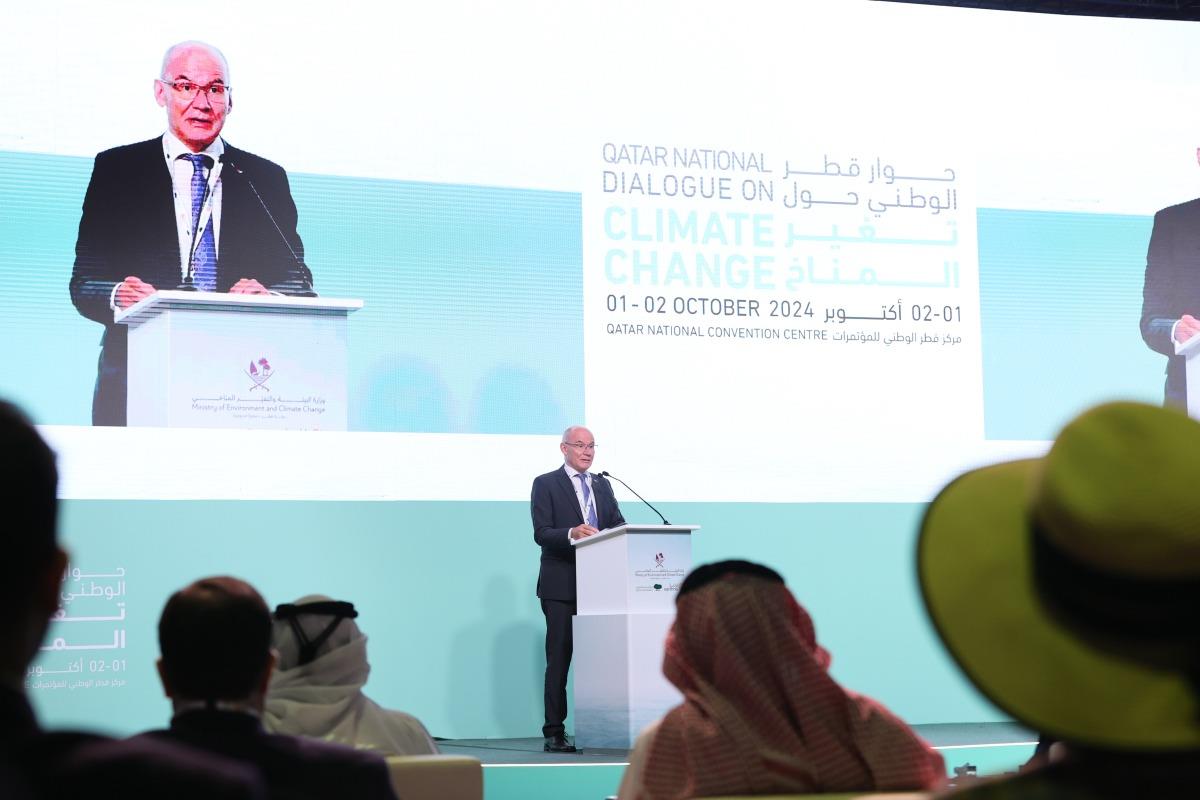
German Embassy Collaborates With Qatar On Climate Initiatives
Doha, Qatar: As climate change emerges as a critical global challenge, the German Embassy in Doha is poised to play a pivotal role in fostering collaboration between Germany and Qatar.
With climate foreign policy taking centre stage in Germany's international efforts, the embassy recently became one of over 50 German Core Climate Embassies worldwide, marking a significant commitment to addressing this pressing issue.
Ambassador of Germany to Qatar H E Lothar Freischlader speaking to The Peninsula said that the recent Qatar National Dialogue on Climate Change (QNDCC) served as a platform for Germany to officially partner with Qatar, highlighting the nations' shared vision for a sustainable future and, signalling the start of a promising partnership aimed at tackling climate challenges through innovative projects and strategic collaboration.
Referring to the embassy's contribution to QNDCC Ambassador Freischlader said,“We were very proud of the impressive line-up of speakers that we organised together with Qatar. Almost half of the speakers were from Germany or represented German companies. Our State Secretary and Special Envoy for International Climate Action Jennifer Morgan contributed with a widely recognised video message.”
Additionally, the embassy conducted the first Doha Climate Talk as one of the sessions at QNDCC in close cooperation with the Ministry of Environment and Climate Change and Earthna Centre of Qatar Foundation. The Climate Talks are a tool, initiated by the German Foreign Office, conducted by the German Embassies abroad and designed to provide a platform for cooperation, exchange and raising awareness.
Ambassador Freischlader expressed his gratitude for giving the premiere of the Doha Climate Talks and its topic“Women's Leadership in Climate Change” an excellent stage.
“The topic was of particular importance for us because women leadership in climate change matters! Research from around the world shows that female leaders are more likely to support climate action. And we do have milestones achieved like the decision agreed at COP18 here in Doha to promote gender balance in UNFCCC negotiations. But still: COP27, for example, had only 35% women in party delegations and there is still a lot of scepticism about female leadership across all regions,” he said.
Ambassador Freischlader emphasised that the German embassy in Doha will continue working with the Ministry of Environment and Climate Change, Earthna and other interested institutions to address climate change challenges.
“The climate crisis is a global problem and therefore we need global solutions. This is why international cooperation is so essential. And Qatar is an important player. It is not only a major producer of LNG with the newest emission reduction methods that play an important role in the phase-out of coal. It is also a leading country for new technology adaptation and innovation. For me, as German Ambassador to Qatar, it is therefore of great importance to further deepen our bilateral cooperation with Qatar in the area of climate change in order to join forces. This is our goal,” he said.
Ambassador Freischlader also lauded Qatar's efforts regarding environmental sustainability and countering climate change by commending the National Climate Change Action Plan and a National Environment and Climate Change-Strategy since 2021, and the fact that environmental development is one of the four pillars of the Qatar National Vision 2030.
“Qatar is also investing in large-scale Carbon Capture and Storage facilities that are a potential technology in reducing greenhouse gas emissions around the world. Around 24 % of Qatar's land areas are now protected areas of importance for wildlife, flora and fauna and the country also has two marine protected areas,” he said.
“Qatar just announced its fourth solar project, together with the goal to increase the percentage of solar power to 30 % of the total production of electricity in the country by 2030. This shows by the way: Renewables are not an experiment, they are an inexhaustible, safe and widely available reality that helps increase diversification and resilience. These are important developments and there are also a lot of smaller initiatives, that are equally important, as every (little) step counts,” Ambassador Freischlader added.
Being asked about the upcoming Conference of the Parties of the UN Framework Convention on Climate Change, the COP29 in Baku with its kick-off in less than a month, the Ambassador Freischlader emphasised the importance of a new global climate finance goal and ambitious national climate targets. “If we as a world do not succeed in maintaining the 1.5°C limit, it will have the most devastating effects, and we already have terrible effects now. Germany of course recognizes its responsibility.
“That is why we committed ourselves to be climate neutral by 2045 and we contributed 10 % to the current international climate finance goal. But no country will contain the climate crisis alone, even though every country will suffer its consequences. The climate crisis is a global problem, and this is why international cooperation is so essential. Germany is 100% committed and we also count on Qatar as a key partner in the region in making the COP29 in Baku a success. The choices we make now and will make in the next few years will play a critical role in deciding the future of our planet and the generations to come”, he concluded.

Legal Disclaimer:
MENAFN provides the
information “as is” without warranty of any kind. We do not accept
any responsibility or liability for the accuracy, content, images,
videos, licenses, completeness, legality, or reliability of the information
contained in this article. If you have any complaints or copyright
issues related to this article, kindly contact the provider above.


















Comments
No comment